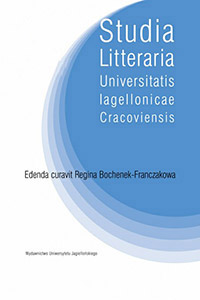Byronism as Madness in Zygmunt Kaczkowski’s Bajronista (The Byronist)
Byronism as Madness in Zygmunt Kaczkowski’s Bajronista (The Byronist)
Author(s): Monika CoghenSubject(s): German Literature, Polish Literature, 19th Century, Theory of Literature
Published by: Wydawnictwo Uniwersytetu Jagiellońskiego
Keywords: Byron; Byronism; Zygmunt Kaczkowski; Bajronista; disease in literature; madness in literature;
Summary/Abstract: The significance of Byron’s presence in Polish culture and its diverse aspects have been widely noted. Not much has been said, however, on the representation of Byronism as a disease. The rumours of Byron’s madness were spread by Annabella, but the very cult of Byron as a celebrity and in particular the attempts of many men who tried to model their life on that of Byron could have been seen as a mental disorder. A fictional study of Byronism as a disease was of ered in Zygmunt Kaczkowski’s novel Bajronista (The Byronist, 1855–1856; 1857), which used as its epigraph the memorable lines from Słowacki’s poem Beniowski, in which the poet declares himself to be a “Byronist”. The aim of this paper is to discuss the representation of Byronism in Kaczkowski’s novel in the context of the Polish reception of Byron. Kaczkowski attempts to present Byronism as a destructive social and cultural phenomenon; hence he uses the image of a disease, which eventually results in actual illness and death. Kaczkowski’s portrayal of Byronic madness is expressive, on the one hand, of the critical tradition represented by Friedrich Schlegel’s charges of atheism against Byron and by Kazimierz Brodziński’s warnings against dangers of following models of English and German poetry, and on the other hand, of the novelist’s disillusionment with the ideology of Polish Romanticism.
Journal: Studia Litteraria Universitatis Iagellonicae Cracoviensis
- Issue Year: 11/2016
- Issue No: 3
- Page Range: 155-166
- Page Count: 12
- Language: English

